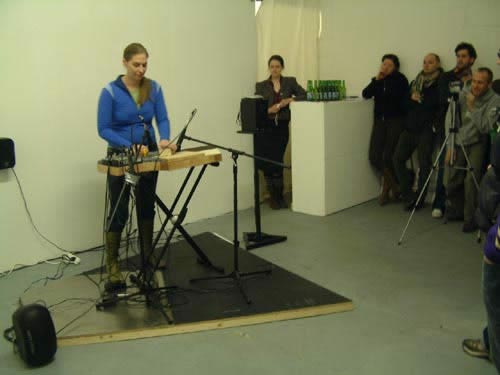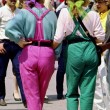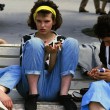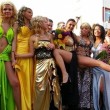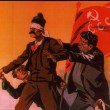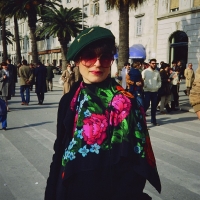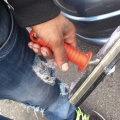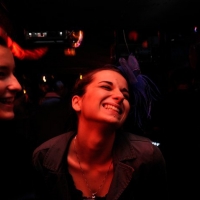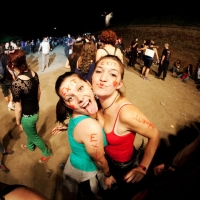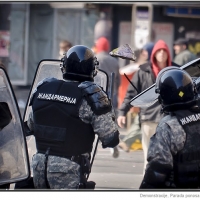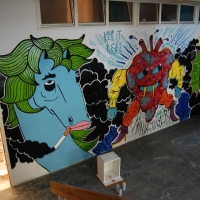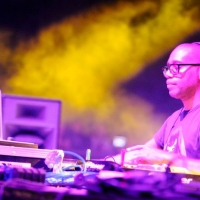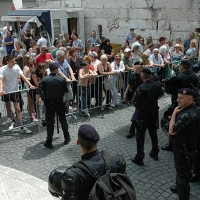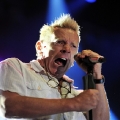The acclaimed Austrian artist speaks about the art world, the relationship between language and visuals and her own “microphoned” floor surface instrument
Elisabeth Penker loves good food, having fun, managing to be a mother and connecting people, but when it comes to art – she is really serious. Beside being a contemporary Austrian artist, she’s also a co-founder of DADA Academy, a group that gathers artists from Austria, Greece, Serbia and Bulgaria, introducing new talents and travelling all over Balkans. She also brings the fact that Austria and parts of the Balkans have once been part of the same country, within the Austro-Hungarian Empire.
According to your huge amount of experience, what is your opinion on the art (world) nowadays?
Art is still a very western-based business. It´s strange we live in the 21 st century and still we are very unconnected in the world. The art world is a small world and just a handful of people are the main decision makers. I think there is great art on every continent but the western art world is uninformed about it.
What do you think about art becoming a big business? What about the idea itself?
I think it’s good to be in the market as an artist. The business of selling art and the business of making art are very different. So generally the ones who are making art and the ones who are selling art have different motivations. Of course there are times when things overlap. The art market generally does not always follow traditional business logic, most of the sales in NYC and London are based on speculation. There are a few select people who are buying art because they love it, but even these types don’t want to be stuck with a bunch of worthless crap so it becomes very important where they are buying the work (i.e. gallery reputation and if there is institutional support for the work.)
You have studied sculpture at the Academy of Fine Arts in Vienna, and for your PhD you chose to write and research about the meaning of language, its structure, rhythm, etc. Can you tell me more about it?
Even my early art work at the academy was based on language, now I’m writing a PHD about cultural translation in visual art, looking at how language and its structure relates to visuals.
Parallel with that, you are working as a musician and you have performed with various artists.
I was an exchange student in Oslo at the National Academy of fine arts and started there to work with sound. Later, I worked as a Sound Designer for Post Production in Film in Chicago and London. There is this crossover between sound art and music. I worked together with local musicians, artists bands and DJs and with a cello player from Vietnam.
Also, you invented a unique instrument, on which you have performed the composition “degrammatical”, as a part of your language examination.
My instrument is called “untitled instrument” and it’s made out of different types of floor materials which are microphoned, much like a “Foley object” which is used for sound effects in films, but it is only a percussive instrument. I play either solo in relation to a sound installation or with other musicians together.
You’ve been in Belgrade once in 2007, participating in the group exhibition in Remont gallery. After a while, you told me that you fell in love with the Serbian Museum of Contemporary Art. Why?
I think it´s a very special building, it’s just really beautiful architecture. As far as I know it is currently getting renovated.
What do you think about the Balkan art scene, which has been put aside/in the back for many many years? Can you somehow advise young artists from the region?
There was a very strong avant-garde in Yugoslavia and as far as I know it’s a very interesting art scene. As for young artists, I would suggest it is good to travel and work abroad and to have a continuation in the work. It is also important to exhibit regularly, as well; it can be self-organized shows in an apartment or founding an artist group… anything to stay busy and networking among your colleagues.
Since three years now, you are one of the founders of DADA Academy. Where was the last show held?
It was in Athens and before that, at the Greek State Museum in Thessaloniki. The co-founder is Panos Papadopolous who lives in Athens and Vienna. We are a travelling academy doing exhibitions, lectures, performances and concerts with various artists.
You won Theodor Körner prize in 2009. Have you met the president?
I got this prize for my scientific (PhD) work and the Austrian president congratulates each prize holder. Austria is a very small country I think anywhere else it would be very unusual.

